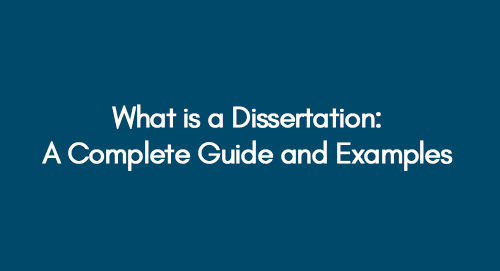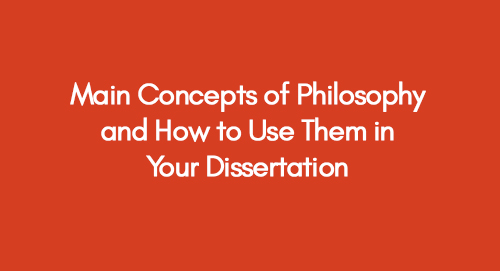
Top 3 MA Dissertation Examples For Student Guidance in 2025
November 28, 2022
2 Best Engineering Dissertation Examples For Inspiration in 2025
November 29, 2022When it comes to writing a dissertation, incorporating a philosophy can make your work more well-rounded and comprehensive. But what exactly is philosophy, and what are the different types of philosophies that you can incorporate into your dissertation?
Philosophy Dissertation TopicsBelow, we'll give a brief overview of the philosophy and some tips on using different types of philosophies in your dissertation.
To have a better understanding, visit the philosophy dissertation examples listed below;
Example: 1 Business Ethics of British Petroleum based on two Contrasting Theoretical Approaches
Example: 2 Factors Influencing Motivation of Dark Tourism Under Theory of Planned Behaviour
Five Main Concepts of Philosophy?
There are four main branches of philosophy.
1. Metaphysics
Metaphysics is concerned with the nature of reality. What is reality? What is the nature of the universe? Are there things that exist beyond our physical world? These are the kinds of questions that metaphysical philosophers try to answer.
2. Ethics
Ethics is the study of morality. It asks questions such as: "What is good?" and "What is bad?" You can integrate ethics into your dissertation by discussing the ethical implications of your research.
3. Epistemology
Epistemology is the study of knowledge. It asks questions such as: "How do we know what we know?" and "How can we be sure that our beliefs are true?" You can integrate epistemology into your dissertation by discussing how your research contributes to our understanding of the world.
4. Ontology
Ontology is the study of being. It asks questions such as: "What is reality?" and "What does it mean to exist?" You can integrate ontology into your dissertation by discussing the ontological assumptions that underlie your research.
5. Logic
Logic is the study of correct reasoning. What makes a good argument? What kind of evidence do we need to believe something? How can we tell if someone is lying to us? These are the kinds of questions that logical philosophers try to answer.
How to Incorporate the Principles Mentioned Above in Your Philosophy Dissertation?
The philosophical concepts are important to integrate into your master's dissertation or thesis because they will help you build a strong and well-rounded philosophical argument. Let's take a closer look at each strategy you can utilize creatively.
1. Argument
An argument in philosophy is a claim that is defended by reasons. The goal of an argument is to persuade the reader that the claim is true. The premises of an argument are the reasons given in support of the claim.
The conclusion of an argument is the claim itself. Arguments can be either valid or invalid, sound or unsound.
- A valid argument is where the premises are true; the conclusion must be true.
- An invalid argument is one where even if the premises are true, the conclusion could still be false.
- A sound argument is valid and has all its true premises.
- An unsound argument is one that is either invalid or has at least one false premise.
2. Counterargument
A counterargument is an objection to a prior objection. In other words, it's an objection to your argument. A counterargument can either be rebutted or not rebutted.
- A rebutted counterargument is one where you provide evidence to show why the counterargument is not true.
- An unrebutted counterargument means that you do not have any evidence to show why the counterargument is not true, and therefore it stands as an objection to your original argument.
3. Rebuttal
A rebuttal is when you provide evidence to show why a counterargument is not true. In other words, it’s when you refute (or disprove) a counterargument with evidence. Rebuttals can either be successful or unsuccessful.
- A successful rebuttal means that you provided evidence to show why the counterargument is not true; therefore, your original argument still stands.
- An unsuccessful rebuttal means that you could not provide evidence to show why the counterargument was not true, and therefore your original argument has been weakened by the counterargument.
Connect With Writer Now
Discuss your requirements with our writers for research assignments, essays, and dissertations.
3 Well-Written Philosophy Dissertation Examples for You
In philosophy, many examples of excellent dissertations have made significant contributions to the field. The following are three of the most famous examples of philosophy dissertations examples.
1. Kant's Critique of Pure Reason
Immanuel Kant's 1781 dissertation is one of the essential works in philosophy. In it, Kant attempts to address the question of whether knowledge can be derived from experience. He argues that while our senses give us access to the empirical world, they cannot provide us with knowledge of things themselves. This work had a profound influence on subsequent philosophers, and it is still studied extensively today.
2. Hegel's Phenomenology of Spirit
Georg Wilhelm Friedrich Hegel's 1807 dissertation is another seminal work in philosophy. In it, Hegel sought to understand the nature of human consciousness. He argued that our consciousness evolves as we encounter different "moments" in history. This work was highly influential in the development of Marxist thought.
3. Wittgenstein's Tractatus Logico-Philosophicus
Ludwig Wittgenstein's 1921 dissertation is one of the most significant works of 20th-century philosophy. In it, Wittgenstein sought to develop a logical foundation for all mathematics and physics. He argued that all meaningful statements could be expressed as propositions that could be either true or false. This work profoundly influenced subsequent philosophers such as Bertrand Russell and Jürgen Habermas.
Conclusion
These are just a few ideas for how you can integrate ethics, epistemology, and ontology into your philosophy dissertation. Remember to discuss these concepts with your supervisor before beginning any work on your dissertation. You can create a well-rounded, persuasive piece by incorporating these three concepts into your paper.
Get an Immediate Response
Discuss your custom requirements with our writers
Get 3+ Free Custom Examples & Topics within 24 hours;
Free Online Plagiarism Checker For Students
We will email you the report within 24 hours.
Upload your file for free plagiarism





























